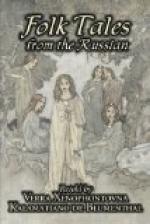“All right,” consented the poor fellow, and at once began to work. Now he was cleaning the big yard, now grooming horses, now bringing water from the well or splitting wood. One week passed, two weeks passed. The rich brother gave him twenty and five copecks, which means only thirteen cents. He also gave him a loaf of black rye bread.
“Many thanks,” said the poor brother, humbly, and was ready to leave for his miserable home. Evidently the conscience of the rich brother smote him, so he called his brother back.
“Why so prompt?” he said; “to-morrow is my birthday; stay to the banquet with us.”
[Illustration: The rich brother]
The poor fellow remained. But even on such a pleasant occasion the unlucky one had no luck. His rich brother was too busy receiving his numerous friends and admirers, all of whom came to tell him how they loved him and what a good man he was. The rich merchant thanked his guests for their love, and bowing low begged his dear guests to eat, drink, and enjoy themselves. There was no time left for the poor brother, and he was overlooked entirely while he sat timidly in a corner, quite forgotten and unnoticed. He had nothing to eat, nothing to drink. But when the crowd was ready to say good-by, before going away, the bright, light-hearted guests bowed to their host and told him many lovely things, and the poor brother did exactly like them. He bowed even lower than they did and expressed more thanks than they. The guests went home singing in their new “telegi,” the peasants’ carts. The poor brother, hungry and very sad, walked along in silence, and the idea came to his mind:
“What if I also tried to sing a cheerful song? The people would believe that I, too, have had a pleasant time at my brother’s house and that I am going home happy like them.”
The good fellow began his song, began—and almost fainted away, for he heard quite distinctly some one behind his back, keeping tune with him in a shrill voice. He stopped. The voice stopped, too. He sang, and the voice continued again.
“Who is there? Come out at once!” shouted the poor man, beside himself. Ha! the monster appeared, lank and yellow, almost a skeleton, covered with rags. The poor fellow was afraid, but had the courage to make the sign of the cross and ask: “Who art thou?”
“I? I am Bitter Woe. I am one of the Russian heroes, Woe Bogotir. I pity all weak people. I pity thee, too, and want to help thee along.”
“All right, Bitter Woe; let us walk together arm in arm. I presume there are no other friends for me in this world.”
“Let us ride, good man,” laughed the monster. “I will be thy faithful companion.”
“Thanks, but on what shall we ride?”
“I do not know on what thou shalt ride, but I, I shall ride on thee,” and Woe jumped on the shoulders of the unlucky man. The poor fellow had no strength to throw him off, so he crawled along his way, the long, hard way, with Woe on his shoulders. He could hardly walk, yet Woe was singing, whistling, and switching him all the time.




